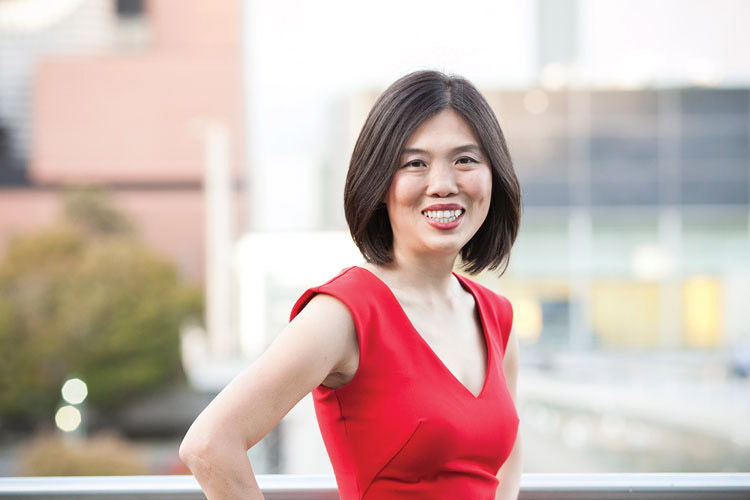How to release self-destructive thoughts and cultivate optimism

Photo illustration by Brenan Sharp/Shutterstock
During this period of COVID-19, when so many of our norms have been disrupted and the future is uncertain, it is an understatement to say there is a lot to feel anxious about.
One of the benefits of having a regular mindfulness and meditation practice is becoming more skillful at getting to know and understand your own thinking, a process known as metacognition. I started to notice that my mind was constantly filled with negative thoughts, and that I was always imagining worst-case scenarios and holding myself to impossible standards and self-criticisms. Cultivating a mind that leans toward optimism, creativity and constructive thinking takes practice, and it’s a skill well worth building.

Photo of Jeena Cho courtesy of the JC Law Group
Starting to gain a deeper knowledge of my own mind, the thoughts that run through it and its impact on me has truly liberated me from habitual negativity. Here are just a few such thoughts: I can’t ever make a mistake. I have to work around the clock to be a good lawyer. I always have to be available to my clients. I am a bad mother if I ever snap at my daughter. There is something wrong with me. I am not likable. I can’t ask for help. Perhaps you see some of your own unproductive thought patterns in this list.
Other lawyers I interviewed for this story also held beliefs that led them down the path of self-criticism. One common struggle was perfectionism. As a lawyer, the pressure to win when the stakes are high can be intense, and this perfectionism can easily bleed over into other areas of one’s life. Claire E. Parsons, a member at Adams, Stepner, Woltermann & Dusing in Covington, Kentucky, realized she had to adjust her expectations and how she approached her life after the quarantine.
“My experience with meditation retreats was invaluable when quarantine started. Just like nobody ‘wins’ a meditation retreat, I knew I couldn’t ‘win’ quarantine,” Parsons says.
Rather than trying to balance work and family perfectly, she instead focused on keeping her spirits up and practicing self-care. “It helped me not only stay afloat in a dark time but also make progress professionally.”
Redefine progress
Megan Peterson, a partner at Simon Peragine Smith & Redfearn, realized after the pandemic that she had to redefine productivity and what a successful day looked like. “This requires a mindfulness approach, because I would designate one big and two to four smaller items to get done in a day, and while tackling the individual tasks would try to keep myself from getting distracted, pulled away by emails or social media, and really focus on doing that one task well.” After she accomplished her one big task of the day, she would check it off her list, catch up on emails and give herself a quick break. She found that by better structuring her day and setting realistic goals, she felt more productive.
Metacognition—starting to unearth the inner narrative we hold about how we must be as lawyers—doesn’t happen overnight. It’s a process. For me, mindfulness, meditation and therapy were critical for gently starting to shift the narrative and stop the cycle of constantly berating myself.
One helpful technique is known as RAIN—coined by Tara Brach, a psychotherapist, meditation teacher and author of several books on self-compassion. RAIN stands for recognize, allow, investigate, nurture. The next time you’re caught in the cycle of negative thoughts, feelings of insecurity or self-doubt, try this practice.
First, recognize what is happening. Often we’re reacting to our thoughts or the inner dialogue but aren’t even aware of it. Simply acknowledge and label the actual experience of the moment. For example, you may constantly check your phone without even realizing it. This behavior may be negatively impacting you, disrupting your sleep or pulling you away from spending quality time with your family. The process of recognizing the experience creates a brief pause in the automatic thoughts or behavior. You might label what is happening by saying to yourself: I am checking my work email again when I do not need to. The second step is to allow. This is the process of permitting whatever may come up—including feelings, emotions, physical sensations or thoughts. In this step, you are practicing being with the discomfort of the moment rather than turning to distractions, avoidant behaviors or other coping strategies. Going back to our example, you might notice feelings of irritation, shame, frustration or other emotions that come up about how attached you are to your smartphone, your lack of balance, or how often you check your work email.
Third, investigate what is happening with gentle attention and kindness without continuing the negative thought patterns or self-judgment. There may be an inner dialogue about how you are always attached to your phone, how you’re not present for your family, lack of self-control and so on. Approach yourself with curiosity and compassion. Perhaps you hold the belief that your boss, colleague or client will think you are a bad lawyer if you don’t instantly respond to their emails. Perhaps you are compulsively checking social media as a way to avoid having difficult conversations or unpleasant feelings.
Fourth, nurture. Self-compassion isn’t about spoiling yourself, letting yourself off the hook or being selfish. It’s about recognizing your suffering and practicing self-care. Perhaps through this line of inquiry, you recognize that there’s a deeply held belief that you’re not good enough, that you’re inadequate or some other painful thought. What does that pained part of you need? How can you meet yourself with kindness?
Finally, after the RAIN comes the practice of recognizing that these thoughts, beliefs or feelings don’t define you. As Brach writes: “The fruit of RAIN is realizing that you are no longer imprisoned in the trance of unworthiness or in any limiting sense of self.”
The practice of overcoming self-criticism or negative beliefs is a gradual process and takes practice. Chances are you have many decades of thinking these thoughts, and it’s going to take time to change the narrative. Fortunately, what we practice gets easier over time. So remember to be gentle with yourself, especially during these challenging times, and try lifting yourself out of darkness with RAIN.
This story was originally published in the Feb/March 2021 issue of the ABA Journal under the headline: “Cultivating Optimism: How to release self-destructive thoughts”
Jeena Cho consults with law firms on stress management and mindfulness. She co-wrote The Anxious Lawyer and practices bankruptcy law with the JC Law Group in San Francisco.



